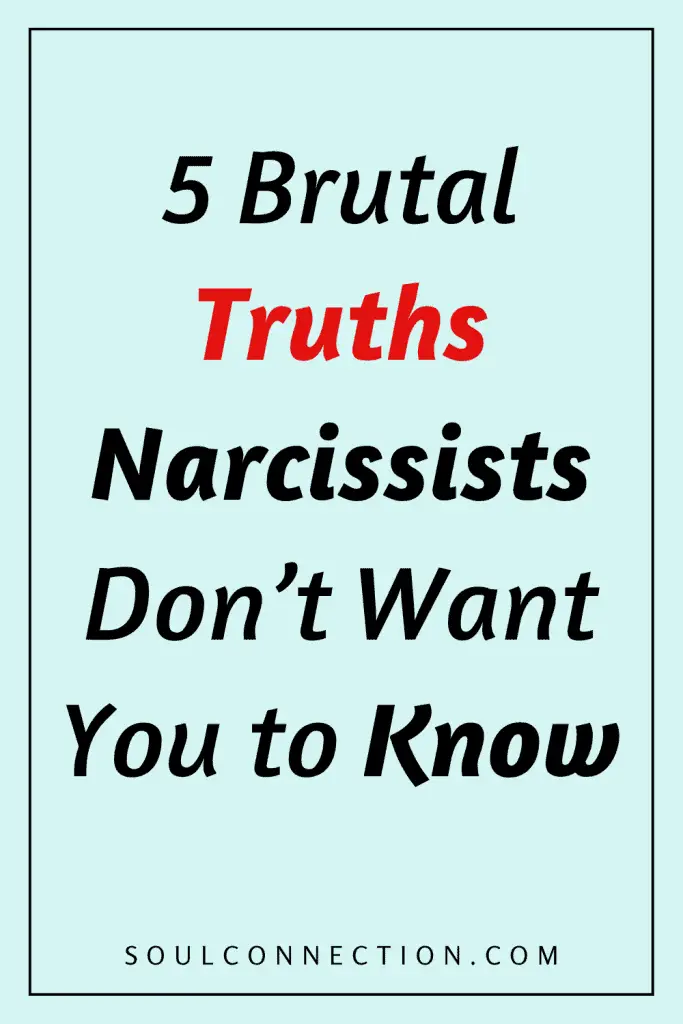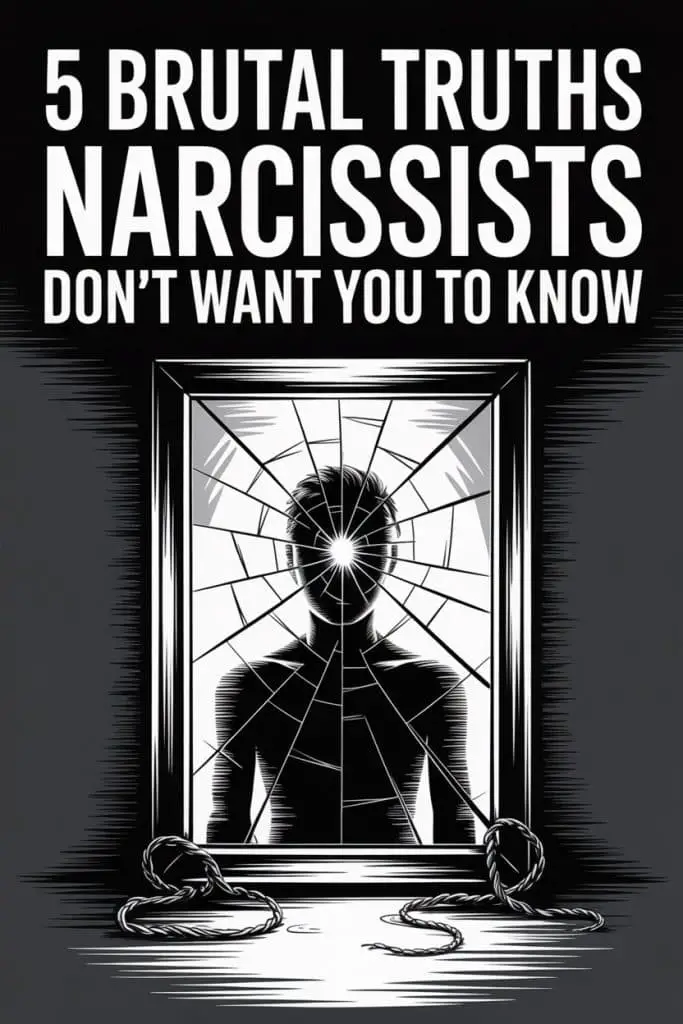Ever tried arguing with a narcissist and felt like you were talking to a brick wall—one that blames you for existing? Welcome to the club.
Narcissists are masters of the illusion: charming, confident, and oh-so-enigmatic, until you realize you’re starring in a psychological magic show where you never get to be the magician.
If you’re looking for the unvarnished truth about what’s really going on behind that smug exterior, grab a cuppa, because it’s about to get painfully real.
1. Narcissists Aren’t as Confident as They Pretend
Ah, the classic peacock display: strutting, grandstanding, and acting as though they invented the concept of “winning.” Seen it? Of course you have.
The truth is, narcissists are often powered by insecurity that could fill an Olympic swimming pool. That dazzling self-assurance? It’s more like duct tape over a deep crack.
Their bravado is a well-rehearsed routine, not a reflection of self-love. Scratch beneath the surface, and you’ll find someone who’s terrified of being exposed as not-so-special.
Cue the endless fishing for compliments, the need to be the center of every dinner party, and the sulking when anyone else gets a sliver of attention. The entire song and dance is a desperate attempt to bury self-doubt.
If you suspect your partner’s “confidence” comes with a side of emotional volatility, you’re probably onto something.
Noticing this doesn’t mean you need to organize a heart-to-heart therapy session (unless you secretly crave chaos). It does mean you can stop believing the hype—and start setting boundaries when the performance gets exhausting.
2. Empathy Isn’t on the Menu
Ever poured your heart out to a narcissist, only to get a blank stare—or, worse, a story about how your problem reminds them of a time they suffered so much more? Welcome to the empathy desert.
Narcissists are wired to prioritize their own feelings, needs, and wounds. Emotional validation? Only if it’s about them.
When you’re in distress, they might play the part (briefly), but it usually circles back to their own drama. The world revolves around them—didn’t you get the memo?
This isn’t about your lack of communication skills or being “too sensitive.” It’s about a fundamental missing gear in their emotional machinery.
Expecting deep, mutual emotional support from a narcissist is like expecting a cactus to give you a hug. You’ll end up feeling prickled and a bit foolish.
If you keep trying to get blood from this particular stone, you’ll only end up depleted. Reserve your emotional energy for the people in your life who actually know how to listen and care.
3. Accountability Is Their Kryptonite
Narcissists may love the mirror, but self-reflection? Not their hobby.
Don’t hold your breath waiting for a narcissist to apologize sincerely or admit fault. They’re allergic to accountability; it messes with their image of perfection.
Every mistake morphs into your fault, your misinterpretation, or—if all else fails—some cosmic injustice.
Ever had an argument that started about them forgetting to call and ended with you apologizing for not “reminding” them? Classic.
Narcissists are experts in the dark art of blame-shifting and rewriting history. They might even gaslight you into doubting your own memories, just to keep the heat off themselves.
Here’s your cheat code: stop wasting energy convincing them to see your perspective. You won’t win. Instead, focus on how you want to handle the aftermath.
Draw clear lines. Refuse to take on guilt that isn’t yours. There’s no merit badge for surviving the Blame Olympics.
4. Their Charms Are a Weapon, Not a Personality
Caught yourself thinking, “But they can be so wonderful sometimes”? That’s not an accident.
Narcissists wield charm like a ninja with a throwing star: targeted, precise, and sometimes a little too good to be true. In the early days, you may find yourself on a honeymoon of compliments, gifts, and dazzling conversation.
You might even believe you’ve found The One—until the mask slips.
This isn’t genuine warmth; it’s a tool for control. When you comply, praise flows freely. When you push back, the cold shoulder comes out.
The cycle of idealization (when you’re adored) and devaluation (when you’re blamed or ignored) is how narcissists keep you emotionally off-balance. It’s not love; it’s manipulation with a spotlight and soundtrack.
Recognizing this pattern is half the battle. The next step? Don’t get swept away by the grand gestures. Focus on the consistency of their actions, not the drama of their words.
If the “nice” version only appears when they want something, you’re not in a romance—you’re on a hamster wheel.
5. The Rules Apply to Everyone—Except Them
Narcissists love rules—ones they make for other people, anyway.
Ever noticed how the standards for behavior get mysteriously one-sided? Maybe you’re expected to be loyal, punctual, and endlessly forgiving, while the narcissist reserves the right to be, well, a walking contradiction.
They may demand honesty, but lie when it suits them. Insist on respect, but offer up plenty of disrespect themselves.
Double standards are their bread and butter. If you call them out, prepare for a dazzling display of rationalization, deflection, or outright denial.
You might even get accused of being “too controlling” or “overly critical.” (Translation: how dare you notice my hypocrisy?)
This isn’t just garden-variety selfishness. It’s a strategy to keep you guessing, constantly working to meet ever-changing expectations. The more confused and off-balance you are, the more power they wield.
Your sanity, on the other hand, starts packing its bags.
You don’t need to accept a rulebook that changes every Tuesday. Stand firm on your own principles. Walk away from the mental tug-of-war. Consistency is your best friend, even if it’s not theirs.
What To Do When the Rose-Colored Glasses Shatter
Observing these brutal truths can sting, especially if you’ve spent years hoping your narcissistic partner would magically transform after reading just the right self-help book. (Spoiler: not likely.)
None of this means you’re doomed to a life of misery or manipulation. Awareness is power. Recognizing the game isn’t cynicism—it’s clarity. You get to decide how much room a narcissist’s drama gets in your head and heart.
Start with boundaries. Not the fluffy, “I wish you’d be nicer” kind, but the real, enforceable sort. Seek out support from people who actually know how to care.
Therapy—solo, couple, or group—can be a game-changer. No shame in needing backup.
Most importantly, give yourself permission to value your well-being as much as a narcissist values their reflection (which is saying something). Prioritize your own peace of mind.
Sometimes that means staying. Sometimes it means going. Only you can decide, and you’re allowed to choose what’s right for you—even if it surprises everyone else.
One last thing: spotting narcissism doesn’t mean you have to become a cynic. But it does mean you can stop expecting water from a stone. Or, for that matter, a cactus.
Your happiness deserves better.


